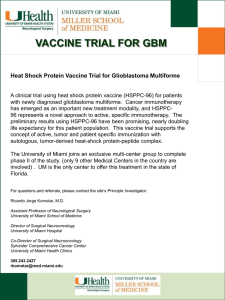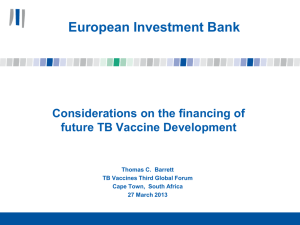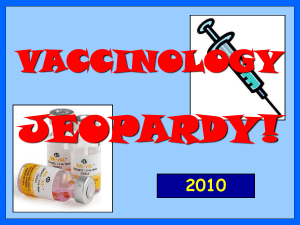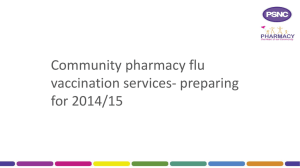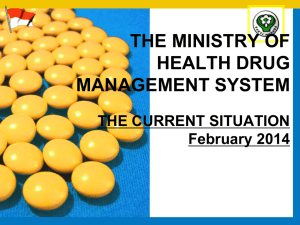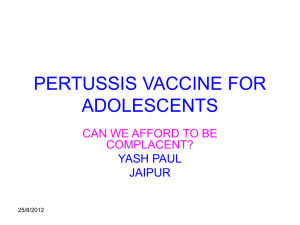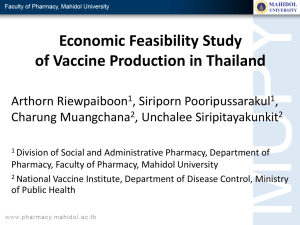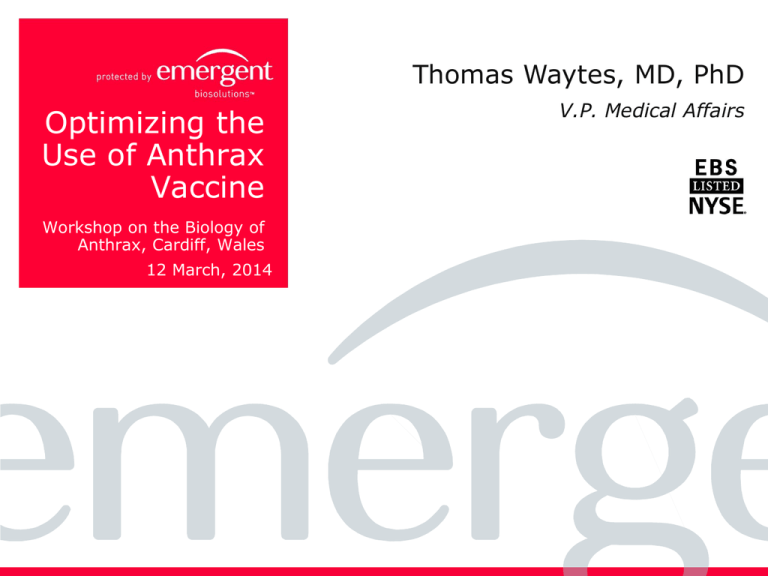
Thomas Waytes, MD, PhD
Optimizing the
Use of Anthrax
Vaccine
Workshop on the Biology of
Anthrax, Cardiff, Wales
12 March, 2014
V.P. Medical Affairs
Optimizing the
Use of Anthrax
Vaccine
Q:
How can a legacy vaccine be
adapted to meet the evolving
requirements for modern bioterror
defense?
2
Anthrax
Vaccines
Anthrax Vaccine for Pre-Exposure Use
Primes the immune system to provide protection against
subsequent exposure to B. anthracis spores
Reserved for individuals at increased risk of exposure
Key desired vaccine attributes:
–
Provide high levels of protective antibody
–
Protection against all strains of B. anthracis
–
Convenient dosing schedule
–
Long-term protection following immunization
–
Low degree of reactogenicity
–
Widely available
3
Anthrax
Vaccines
Anthrax Vaccine for Post-Exposure Use*
To protect unvaccinated individuals after exposure to
aerosolized B. anthracis spores
Used in combination with appropriate antibiotics
Key desired vaccine attributes:
–
Quickly provide protective levels of antibody
–
Protection against all strains of B. anthracis
–
Minimum number of doses required for protection
–
Acceptable degree of reactogenicity
–
Long shelf life
–
Widely available
* No anthrax vaccines are currently approved for postexposure prophylaxis
4
BioThrax
Vaccine
BioThrax™ and any
and all Emergent
BioSolutions Inc.
brand, product, service
and feature names,
logos and slogans are
trademarks or
registered trademarks
of Emergent
BioSolutions Inc. or its
subsidiaries in the
United States or other
countries. All rights
Reserved.
BioThrax® (Anthrax Vaccine Adsorbed)
Initially licensed in the US in 1970 as a six-dose
subcutaneous primary schedule (over 18 months)
with annual boosters
Currently the only FDA-licensed anthrax vaccine for
the active immunization of adults to prevent anthrax
infection
Manufactured from sterile culture filtrate, made
from a non-virulent strain of Bacillus anthracis
Primary component is protective antigen (PA), with
aluminum hydroxide used as an adjuvant
More than 12 million doses have been administered
to over 3 million people
Safety assessed in more than 25 scientific studies
Four year shelf life.
5
BioThrax
CDC AVRP
CDC Anthrax Vaccine Research Program
(AVRP)
Vaccination Schedule by Group
Weeks
Group
Route
N
TRT-8SC
SC
TRT-8IM
Months
0
2
4
6
12
18
30
42
259
v
v
v
v
v
v
v
v
IM
262
v
v
v
v
v
v
v
v
TRT-7IM
IM
256
v
s
v
v
v
v
v
v
TRT-5IM
IM
258
v
s
v
v
s
v
s
v
TRT-4IM
IM
268
v
s
v
v
s
s
s
v
Control IM
IM
127
s
s
s
s
s
s
s
s
Control SC
SC
133
s
s
s
s
s
s
s
s
NHP
IM
v
v
Ch
Ch
Ch
v
v = BioThrax Vaccine, s = saline, NHP=Non-Human Primate,
Ch = aerosolized B. anthracis spore challenge
6
BioThrax
CDC AVRP
CDC Anthrax Vaccine Research Program
(AVRP) – Early Results
Changing route of administration from subcutaneous (s.c.)
to intramuscular (i.m.) resulted in a marked reduction in
injection-site reactogenicity
Changing route of administration from s.c. to i.m. did not
impact long-term immunogenicity
Eliminating the week-two dose of BioThrax vaccine did not
alter the long-term immunogenicity
Impact:
In December 2008, FDA approved BioThrax label changes
to:
–
Change the route of administration from s.c. to i.m.
–
Change the dose schedule from 6-dose primary series to 5dose primary series, by eliminating the week-two dose
Ref: Marano, et al (2008), JAMA, 13:1532-1543.
7
BioThrax
CDC AVRP
CDC Anthrax Vaccine Immunogenicity
Ref: Wright, et al (2009): Safety and Efficacy of a Reduced Schedule
of Anthrax Vaccine. ICAAC.
8
BioThrax
CDC AVRP
CDC Anthrax Vaccine Research Program
(AVRP) – Final Results
Immune responses following the month-6 dose of the five-dose
primary schedule were non-inferior to those following later
doses
Immune responses following the month-42 vaccination were
higher in the group that previously received only 3 doses of
vaccine at 0, 1, and 6 months, than were those in the group
that had received vaccine using the 5- or 6-dose schedule
Impact:
In May 2012, FDA approved BioThrax label change to:
–
Change the dose schedule from a 5-dose to a 3-dose i.m.
primary series with boosters at 12 & 18 months, then annually
In June 2013, PEI approved Market Authorization for BioThrax
with a 3-dose primary series with boosters at 3-year intervals
Ref: Wright, et al, (2014) Effect of reduced dose schedules and intramuscular injection of
Anthrax Vaccine Adsorbed on immunological response and safety profile: A randomized
trial. Vaccine ; 32:1019-1028.
9
BioThrax
CDC AVRP
Challenge
Time (mo)
NHP Challenges with Aerosolized
B. anthracis Spores (at 30 & 52 Months)
AVA Dilution*
Number of Survivors /Total Number
of Animals Challenged (%)
30
HuAVA
10/10 (100.0%)
30
1:5
8/8 (100.0%)
30
1:10
6/9 (66.7%)
30
1:20
7/8 (87.5%)
52
HuAVA
8/10 (80.0%)
52
1:5
9/9 (100.0%)
52
1:10
6/10 (60.0%)
Saline or no
vaccination
11/45 (24.4%)
Control (all
groups)
*All NHP immunized at 0, 1, and 6 months.; HuAVA = full human dose
Adapted from: C. Quinn et al, (2012), Clin. and Vaccine Immunol.; 19:1730-1745.
10
PEP
Strategy
The FDA “Animal Rule” Criteria
There is a reasonably well-understood pathophysiological
mechanism of the toxicity of the substance and its
prevention or substantial reduction by the product
The effect is demonstrated in more than one animal
species expected to react with a response predictive for
humans, unless the effect is demonstrated in a single
animal species that represents a sufficiently wellcharacterized animal model for predicting the response in
humans
The animal study endpoint is clearly related to the desired
benefit in humans, which is generally the enhancement of
survival or prevention of major morbidity
The kinetics, pharmacodynamics, and other relevant data
in animals and humans, allows selection of an effective
dose in humans
11
PEP
Strategy
Strategy to Derive an Immune Correlate
of Protection
Clinical Trial Data
Relationship
Between TNA Titer
and Protection
Relationship
Between TNA Titer
and Protection
Choose TNA
Titer
Associated
with High
Degree of
Protection
GMT TNA NF50
Pre-Exposure (GUP) Studies
2
1.8
1.6
1.4
1.2
1
0.8
0.6
0.4
0.2
0
PEP
Strategy
0
7
14
21 28 35 42 49 56 63 70 77 84
91 98 105
Time Point (Days)
Confirmation of Clinical Results
and
Calculation of
Predictive
Vaccine Efficacy
12
PEP
Strategy
Immune Correlate of Protection
Derived from Pre-exposure (GUP) Models*
Purpose: Establish relationship between pre-challenge TNA titer
and survival in animals to derive correlate of protection
Dosage: Undiluted to 1:256
Schedule: Days 0 and 28
Anthrax challenge: Day 70
–
Simulates timing of human exposure to residual spores after antibiotics
–
200 LD50 = 20 million spores in the rabbit; very robust challenge
Immunological endpoint: TNA titers
Sample sizes:
–
24 rabbits/group (12 controls)
–
8 monkeys/group (8 controls)
Ref: Ionin et al, (2013), Clin. Vaccine Immunol. 20:1016-1026.
*PEP studies supported by BARDA contract HHSO100200700037C
(G.U.P = General Use Prophylaxis)
13
PEP
Strategy
Rabbit GUP Model: Stratifies the Immune
Response Prior to Challenge
TNA NF50 (GMT +/- 95% CI)
100
BioThrax
BioThrax
BioThrax
BioThrax
Control
10
1:4
1:16
1:64
1:256
1
0.1
0.01
0
10
20
30
40
50
60
70
Study Day
Anthrax
Challenge
(200 LD50)
Ref: Ionin et al, (2013), Clin. Vaccine Immunol. 20:1016-1026.
14
PEP
Strategy
Pivotal Clinical Study:
Immunogenicity Endpoints
Design:
– 200 subjects each to receive BioThrax vaccine by the s.c. route at days 0, 14,
and 28
– Repeated measurement of immune responses (TNA)
Proposed Primary Immunogenicity Endpoint:
– The proportion of subjects achieving a TNA response of at least 0.56 at Day 63
(five weeks following the third vaccination on Day 28)
Proposed Secondary Endpoints with Defined Success Criteria:
– Proportion above threshold achieving a TNA of at least 0.56 at Day 70
– Average proportion achieving a TNA of at least 0.56 between Day 63 to Day
100 (inclusive)
Proposed Success Criterion:
– Lower bound of the 2-sided 95% CI of the proportion of subjects who meet or
exceed a TNA titer of 0.56 must be ≥ 40% on Day 63
Ref: Ionin et al, (2013), Clin. Vaccine Immunol. 20:1016-1026.
15
PEP
Strategy
Study Conclusion
• BioThrax vaccine was administered as 3 s.c. PEP doses on Days
0, 14, and 28
• The study met the prospectively defined success criteria for the
primary and first two secondary immunogenicity endpoints for
which success criteria were prospectively defined
BioThrax is not currently approved for post-exposure prophylaxis
*PEP studies supported by BARDA contract HHSO100200700037C
16
BioThrax
Vaccine Plus
CPG 7909
Increased and Accelerated Immune
Response when BioThrax Vaccine is
Given with CPG 7909 Adjuvant
6.3-fold increase at peak
21-day
acceleration
to peak AVA
(1)
(2)
(3)
Ref: Rynkiewicz, et al, (2011), Vaccine, 29:6313-20
17
BioThrax
Vaccine Plus
CPG 7909
NuThraxTM (Anthrax Vaccine Adsorbed
with CPG 7909): Development Strategy*
A dose-ranging study of candidate NuThrax formulations
demonstrated that, compared to BioThrax vaccine , each
formulation elicited a higher and accelerated immune
response after 2 doses given 2 weeks apart
Additional studies of doses and dosing regimens are
currently underway to further assess NuThrax
immunogenicity and reactogenicity
Ref: Hopkins, et al, (2013), Vaccine, 31:3051-3058.
* AV7909 studies supported by NIAID contracts
HHSN272200800051C and HHSN272201000035C.
18
Optimizing the
Use of Anthrax
Vaccine
BioThrax Vaccine – Using it Smarter
Reduced reactogenicity using intramuscular route
Reduced doses in primary series (0, 1, 6-months)
Three-year booster schedule (Germany)
Expanded availability (new production facility)
Four-year shelf life
Potential for 3-dose PEP indication
Potential for new anthrax vaccine with accelerated
protective response using CpG adjuvant
19
Optimizing the
Use of Anthrax
Vaccine
THANK YOU VERY MUCH
FOR YOUR ATTENTION
“BioThrax™ and NuThraxTM and any and all
Emergent BioSolutions Inc. brand, product, service
and feature names, logos and slogans are
trademarks or registered trademarks of Emergent
BioSolutions Inc. or its subsidiaries in the United
States or other countries. All rights Reserved..”
20


